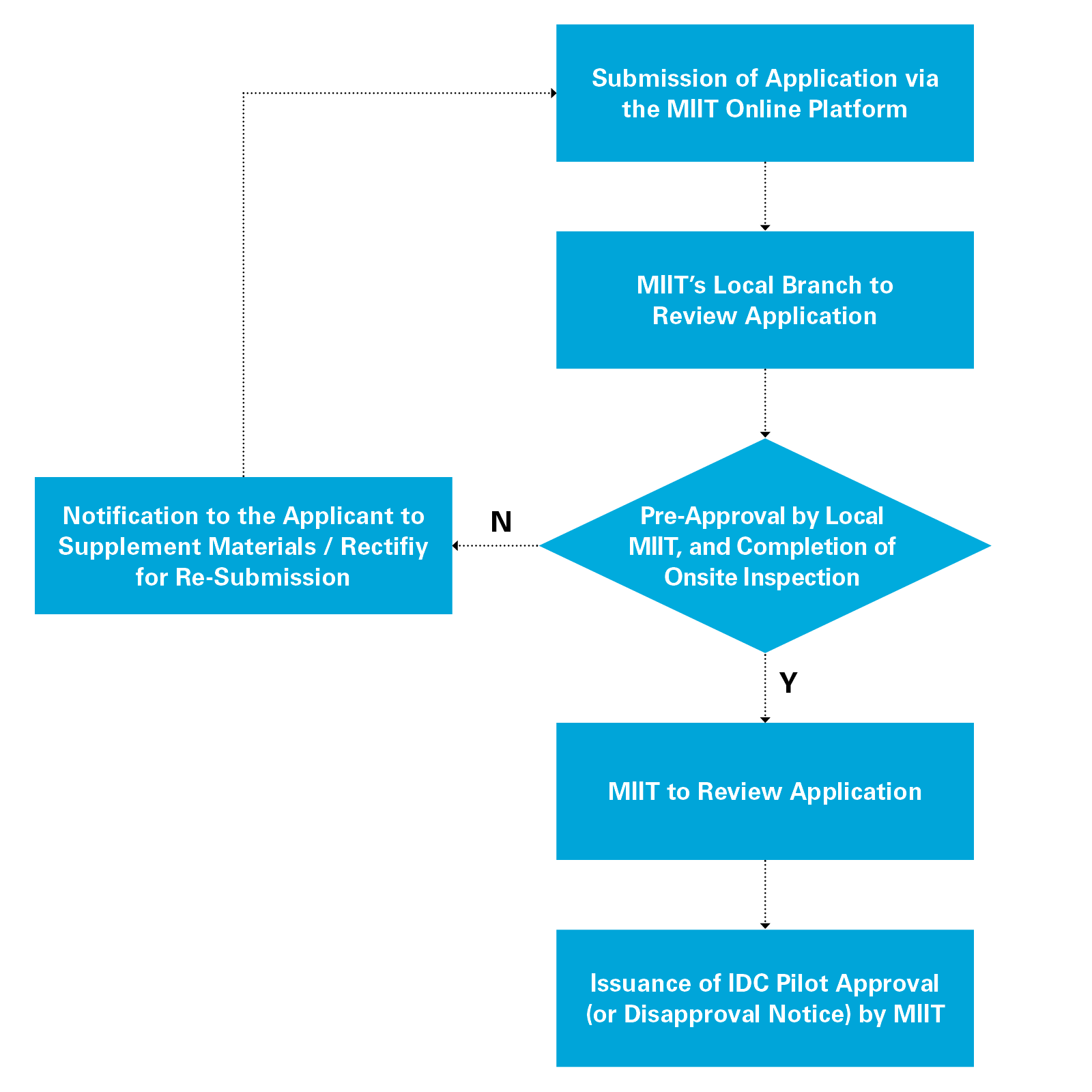Breaking Barriers: China’s New IDC Open-Up Opportunities for Foreign Investors
May 19, 2025
The demand for data centers is skyrocketing in the era of digital transformation, driven by the growth of cloud computing and AI technologies. Historically, China has tightly restricted or even barred foreign investment in internet data centers. But now, as part of China’s ongoing efforts to liberalize its heavily regulated telecom services sector, the Chinese government has launched a long-awaited pilot program that started in late 2024 that lifts the foreign investment restrictions on internet data centers (the “Pilot Program“). In four pilot areas including Beijing, Shanghai, Shenzhen and Hainan, foreign investors can now wholly own internet data centers (IDC).
In this alert, we summarize the Pilot Program for foreign investment in internet data centers and provide practical guidance for foreign investors to apply for the IDC operation approval.
Foreign Investment Restrictions Prior to the Pilot Program
Internet data center operators in China must hold the IDC service license (the “IDC License“), which is categorized as the “B11” license under the Telecommunications Services Classification Catalogue.
Prior to the Pilot Program, foreign investors were generally prohibited from investing and operating internet data centers in China. The only two exceptions were:
- any foreign investor may set up a wholly owned company or joint venture in Hainan Province to provide data center services to users in Hainan or outside China, with its service facilities located in Hainan; and
- Hong Kong or Macau investors qualified under the Closer Economic Partnership Arrangement with the Chinese Mainland (CEPA), may hold no more than 50% of equity interest in an IDC License holder incorporating and operating anywhere in China.
Foreign investors, including cloud service providers, have primarily been limited to using one of the following alternative structures to indirectly own or operate IDC services in China, although none may be as effective as a direct ownership structure:
- Commercial Cooperation Model: This model is commonly used by foreign cloud service providers in China. In this arrangement, foreign service providers enter into a cooperation arrangement with Chinese domestic data center operators, who hold the IDC License. The foreign service provider licenses its brand and provides technical support to the Chinese IDC License holder. The cloud services are provided by the Chinese IDC License holder to end users, and foreign investors receive their share of revenue through license or service fees.
- VIE Structure: Similar to other restricted value-added telecom sectors, the “variable interest entity” or VIE structure is also widely used by foreign investors to control and own internet data centers in China, particularly those listed on foreign stock exchanges. Under the VIE structure, a foreign investor, through its wholly owned subsidiary in China, typically owns the substantive assets of the data center, such as real properties and equipment. A domestic PRC company owned by PRC founders or their nominees, holds the IDC License and leases assets from the foreign investor. The foreign investor secures actual control over, and receives substantial economic benefits from, the Chinese IDC License holder through a series of contractual agreements, such as proxy agreements, property and equipment leasing agreements and technical service agreements.
Key Milestones of the Pilot Program
The Pilot Program is launched by the Ministry of Industry and Information Technology (the “MIIT“), with key milestones as below:
- On April 8, 2024, the MIIT issued the Circular on the Launching of Pilot Program to Expand the Opening-up in Value-added Telecommunications Service to Foreign Investment (MIIT Notice [2024] No. 107) (the “Pilot Circular”) to lift foreign investment restrictions in IDC services and other value-added telecommunications services (“VATS“) sectors in certain pilot areas.1 The initial four pilot areas2 (the “Pilot Areas“) include:
- the entire municipality of Beijing;
- the entire municipality of Shenzhen;
- Shanghai, limited to Shanghai’s Lin-Gang Special Area and Pudong New Area; and
- Hainan Free Trade Zone, i.e., the entire province of Hainan, excluding Sansha Municipality.
The Pilot Circular further delegated authority to local governments in the Pilot Areas to formulate their respective implementation rules, which are subject to the MIIT’s approval.
- On October 23, 2024, the MIIT formally granted approvals to the Pilot Areas to initiate the Pilot Program. Foreign invested companies can then start to submit their applications online through MIIT’s e-government service platform for IDC operation approval.
- In November 2024, each Pilot Area subsequently published application guidelines to implement the Pilot Program.
- The local branches of MIIT in Pilot Areas have also started accepting applications from foreign investors (such as Tesla) for IDC operation approvals. Some of the applicants have completed the preliminary review by the MIIT’s local branch and are awaiting the MIIT’s final approval. However, as far as we are aware, none have received final approval from the MIIT yet.3
How to Apply for IDC Pilot Approval
Foreign invested companies under the Pilot Program permitted to engage in IDC services will receive a Telecom Business Operation Pilot Approval (the “IDC Pilot Approval“) from the MIIT, rather than a traditional IDC License issued by the MIIT or its provincial counterparts to domestic IDC operators. The IDC Pilot Approval is presumed to have the same legal effect as the IDC License. The validity term of the IDC Pilot Approval is anticipated to be five (5) years, the same as the IDC License.
- Qualification Requirements
In accordance with the principles of equal treatment, the qualification requirements for IDC operators are generally the same for both foreign invested companies and pure domestic PRC companies.
Foreign invested companies must satisfy general qualification requirements applicable to their Chinese counterparts, as well as special requirements under the Pilot Program as set forth below:
| General Requirements | |
| Registered Capital | The registered capital of the applicant must be no less than RMB 10 million if it operates country-wide business, or RMB 1 million if it operates within a province or equivalent region.4 |
| Employees | The applicant must have fund and professional workforce commensurate with its IDC business. Newly established foreign invested companies must submit proof of social security contributions for at least three (3) employees for a minimum of one (1) month. |
| Assets | The applicant must have the properties (either owned or leased), equipment and technology to operate the data center. The switching and routing equipment have obtained the Telecom Equipment Network Access License. MIIT or its local counterpart will conduct an onsite inspection on the applicant’s data center facilities and equipment. |
| Special Requirements Under the Pilot Program | |
| Place of Incorporation | The foreign enterprise must be incorporated within a Pilot Area. |
| Location of Service Facilities | IDC service facilities, whether self-owned or leased, must be located within the same Pilot Area. |
Note that a domestic IDC operator is permitted to hold a standalone country-wide IDC License, which allows them to set up multiple data centers across various provinces or regions. However, under the Pilot Program, the data center infrastructure and facilities of a foreign-invested IDC must be located within the same Pilot Area where it is incorporated, although such data center is allowed to provide IDC services to users all over China. That said, if a foreign investor intends to set up its data center service infrastructures and facilities in different Pilot Areas, it will need to form project companies in each relevant Pilot Area and apply for separate IDC Pilot Approvals.
- Application Process and Timeline
The application for IDC Pilot Approval involves a preliminary review by the MIIT’s provincial or municipal branch in the relevant Pilot Area (e.g., the Shanghai Communications Administration) and final approval by the MIIT. During the preliminary review process, the local MIIT branch in the relevant Pilot Area may team up with the MIIT in conducting onsite inspections to verify the existence of the applicant’s IDC infrastructures, facilities and equipment.
According to relevant guidelines published by the MIIT for the application of IDC License5 and our consultation with the MIIT and its relevant local counterparts, the typical application process for the IDC Pilot Approval is as follows:
Key Takeaways and Observations
The Pilot Program offers foreign investors new opportunities to reassess the structuring of their data center operations in China, whether currently structured through a commercial cooperation model or a VIE model. Direct ownership of data centers provides foreign investors with more effective control and reduces unnecessary administrative costs and regulatory uncertainties.
Multinational companies face increasing demands to store data locally in China as the government tightens scrutiny on cross-border data transfers. This demand, combined with the AI competition in China, fueled by DeepSeek’s launch, creates an attractive opportunity for foreign investors to own data centers in China – an opportunity that was largely unavailable before.
Foreign investors can now set up their data centers in one of the four initial Pilot Areas. The qualification requirements and application procedures in these areas are closely aligned. When selecting a location, foreign investors may consider proximity to clients and end-users, and the readiness of real properties for data centers. Local data protection pilot policies and other preferential treatments could also play a crucial role in site selection. For example, Hainan government provides a green channel exempting data centers located in Hainan from cross-border data transfer approvals if they process and transfer data collected outside China. This can facilitate the operation of international data centers in Hainan.
Foreign investments in the IDC sector may trigger national security reviews. However, it is reasonable to anticipate that the foreign investment into data centers under the Pilot Program is less likely to face barriers for national security reasons, so long as it has obtained the IDC Pilot Approval from the MIIT.
Local governments are encouraging foreign invested companies to set up data centers in the Pilot Areas. Since the Pilot Program is still new, relevant government authorities are willing to provide close guidance to assist foreign investors in navigating the application process. Foreign investors are recommended to consult with the local MIIT when preparing application documents.
1 Other VATS sectors that are fully open to foreign investors under the Pilot Circular include: (i) Content Delivery Networks (CDN), (ii) Internet Service Providers (ISP), (iii) online data processing and transaction processing (EDI), (iv) information publishing platforms and information delivery services (ICP) (excluding services related to internet news information, online publishing, internet radio and television, and internet culture management), and (v) information protection and processing services.
2 As the MIIT assesses the implementation of the Pilot Program as it progresses, additional areas may be included.
3 On February 28, 2025, the MIIT unveiled the first batch of VATS pilot approvals for 13 foreign invested companies in the Pilot Areas, which include Siemens, Dun & Bradstreet and T-Systems, although the specific VATS categories approved for these companies are not disclosed. Based on our communication with the MIIT and its relevant local branches, most companies on this initial list were approved to operate ICP services, while none of them appear to be data center operators.
4 Based on our consultation with the local MIIT branches, in practice, a foreign-invested company looking to participate in the Pilot Program is expected to have a minimum registered capital of RMB 10 million.
5 See Service Guide for the Approval of Value-Added Telecommunications Business Operating License, published on MIIT’s official website.
White & Case means the international legal practice comprising White & Case LLP, a New York State registered limited liability partnership, White & Case LLP, a limited liability partnership incorporated under English law and all other affiliated partnerships, companies and entities.
This article is prepared for the general information of interested persons. It is not, and does not attempt to be, comprehensive in nature. Due to the general nature of its content, it should not be regarded as legal advice.
© 2025 White & Case LLP
Search
RECENT PRESS RELEASES
Related Post





